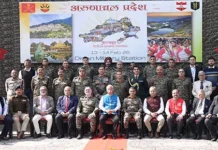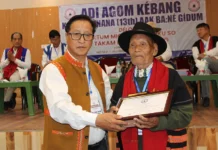YUPIA, 23 Dec: “Governance will be effective, efficient and transparent if it is participatory, cutting across all sections of the society, irrespective of gender, religion, age, caste and creed,” said Papum Pare DC Sachin Rana.
He was addressing the ZPMs, panchayat members and HoDs of the district during the inaugural session of a workshop on good governance here on Friday.
Emphasising the need for a “responsive government service delivery system,” Rana said that “delayed response to public grievances and services is bad governance. Our officers and other government service providers should work towards responsive governance, where services are delivered on time, responsively.”
ZPC Chukhu Bablu called for “developing a strong feedback mechanism from the public regarding the government services and their delivery mechanisms.”
Stating that “the PRIs are also local self-governments in themselves,” he urged the PRI members to “work out a roadmap to improvise information dissemination regarding government programme, circulars and orders, in consultation with the departments implementing the programmes and policies.”
Speaking about the implementation of the JJM in the district, PHED EE Shawan Riang said that the role of the village water & sanitation committee in planning, implementation, management, operation and maintenance of in-village water supply infrastructure is important.
He informed that, out of the 24,851 households in the district, 11,785 houses have been provided with functional household tap connections, and that “the remaining 13,066 will be covered by 2023.”
Trade Development Officer Tai Arun spoke about the legal market practices and initiatives of the department.
“The Papum Pare district trade and development office is the first in the state to onboard the ‘ease of doing business’ e-platform, and provides online trading licence services. This has enabled the district to rise in the revenue generation rankings, and the district stands at 8th out of 26 DCs and 4th out of 37 ADCs,” he informed.
“The department has conducted a three-month-long awareness campaign in all the administrative blocks of the district on good and legal market practices, which has resulted in general awareness on market-related laws like the COPTA, 2003, the Arunachal Pradesh Excise Act, 1993, the Petroleum Act, 1934, the Juvenile Justice Act, 2015, etc, and brought about behavioural changes like eradication of middlemen and fake trading licence system, and made many schools tobacco-free zones,” he informed.
District Transport Officer (DTO) Yumlam Ajum Lombi said that Papum Pare is the first district in the state to implement issuance of PVC driving licence cards.
Dwelling on traffic awareness, the DTO sought cooperation from all the panchayat members “in creating a mass movement for traffic awareness to prevent road accident deaths.”
DMO Dr Komling Perme made a presentation on the AYUSH wellness centres and important health indicators, and called for coordination and cooperation among all the stakeholders to improve them.
Presenting the 5th national family health survey report, he said: “Although the institutional delivery rate has jumped from 50.8 to 77.3, fully immunised children from 34.9 to 60.7, family planning adoption from 12.8 to 47.7, and unmet needs have reduced from 32.2 to 20.3, we should not be complacent; rather, concerted efforts have to be made to improve the indicators.”
The workshop was conducted as part of the Good Governance Week. (DIPRO)




